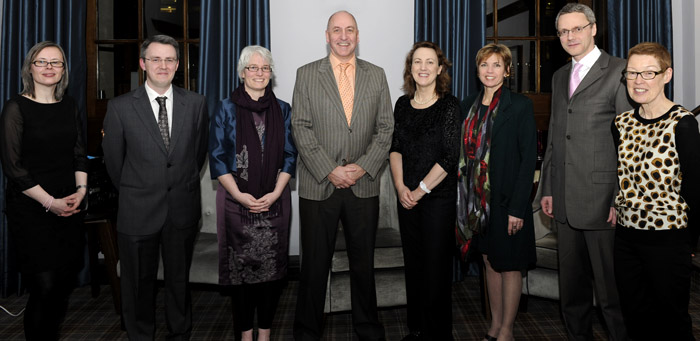
RESEARCH into the use of social media by young professionals has won funding from a key academic body.
The Higher Education Academy (HEA) has awarded £54,516 to support a PhD student at the University of Stirling for the next three years. The award was one of five Mike Baker Doctoral Programme awards made by the HEA this year.
The University has matched this sum - allowing a second PhD student to be recruited to work on the study, entitled “E-professionalism in the education of professionals: dilemmas and possibilities".
Research work will start this September, with both students being recruited between now and July this year.
The PhD students will be supervised by Professor Tara Fenwick, from Stirling's School of Education. Professor Fenwick has published extensively on professionalism and professional education, and is the Director of Stirling’s international research network ProPEL: Professional Practice, Education and Learning.
Social media tools like Facebook, Twitter and LinkedIn can be valuable resources for professionals – but can also present real dangers for users.
Said Professor Fenwick: “This new study will examine the use of social media use by student professionals - particularly those training in social work, nursing, teaching and medicine.
“Many negative issues of professionalism are raised around social media in practice, often in an anxious spirit of regulating and limiting students’ use of social media. Yet these virtual worlds also afford new possibilities for practice and new forms of professionalism, which are under-explored."
She added: "I’m pleased that the Higher Education Academy has committed significant funding to support this important new research and welcome the Academy’s support.
"The award was particularly prestigious as there were 80 applications from across the UK for this funding, and only five awards this year.
"The HEA funding been generously matched by the University - allowing us to recruit not one but two students to carry out this research.
"This vital funding will support a particularly innovative project. We're really excited to launch a new exploration of digital services in professional practice."
The Higher Education Academy (www.heacademy.ac.uk) champions excellent learning and teaching in higher education.
The national and independent organisation - funded by the four UK HE funding bodies and by subscriptions and grants - runs its annual Doctoral Programme, supporting universities across the UK.
Professor Craig Mahoney, Chief Executive of the HEA, said: “Over the coming months and years we’ll be working closely with the recipients and their PhD student to make a real difference to pedagogic [teaching] knowledge which will ultimately have an impact on the student learning experience of thousands of students."
He added: “I’m confident that the research outputs from our Doctoral Programme, whether from discipline-specific or generic pedagogic research, will have a significant impact on both policy and practice in higher education both in the UK and beyond. I look forward to working with our award winners as they develop and carry out their projects.”
The Mike Baker Doctoral Programme Awards 2013 from The Higher Education Academy on Vimeo.
About Professor Fenwick
Professor Tara Fenwick, Professor of Professional Education, School of Education, University of Stirling
Alongside her role at the University of Stirling Professor Tara Fenwick is founding Director of ProPEL, the international network for research in Professional Practice, Education and Learning.
Her remit at Stirling is broad and interdisciplinary: to promote innovative, critical studies of professional knowledge and work across domains such as health care, management, social services, policing and education, and to explore effective new approaches to support professional learning in workplaces as well as in higher education and community. ProPEL’s projects are qualitative and collaborative, involving several PhD students and postdocs as well as research associates across Europe/UK, North America and Australia.
Prior to taking up this post in January 2010, Tara spent her academic career in Canada – most recently as Professor and Head of Department of Educational Studies at the University of British Columbia in Vancouver. Her research and publications have focused on the changing arrangements of work practices in settings ranging from small businesses to garment factories, and their effects on what counts as knowledge and what happens to practitioners. She has written extensively about work learning in relation to gender, work identities, networks, self-employment, critical human resource development, and social responsibility (for full list see www.ioe.stir.ac.uk/staff/ProfessorTaraFenwick.php). Her book Learning Through Experience: Troubling Assumptions and Intersecting Questions (Krieger, 2003) was granted the 2004 Award for Outstanding Contribution to Adult Education Literature by the American Association for Adult and Continuing Education.
In her current research on changing professionalisms, professional work and learning, Tara has become particularly interested in the sociomaterial configurations of practice and knowing, such as digital technologies. Her recent books explore these sociomaterial perspectives: Emerging Approaches to Educational Research: Tracing the Socio-Material, published in 2011 with co-authors Richard Edwards and Peter Sawchuk, and Actor Network Theory in Education in 2010 with co-author Richard Edwards. She and her colleagues are committed to understanding not just how ‘matter’ configures learning processes, but how material and technological dynamics influence what knowledge ‘matters’ most, and what this means for professional learning and responsibility. Her doctoral project explores the new challenges of social media for students learning professions such as nursing, teaching and social work – an area that is coming to be known as ‘e-professionalism’. This project will examine not only the dilemmas but also the future possibilities afforded by new social media for pre-service professional students.
